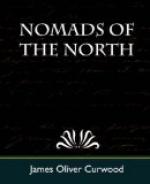But a strange thing happened. He had travelled twenty miles to the ridge, and fifteen of the twenty miles back, when a shelf of snow gave way under his feet and he was pitched suddenly downward. When he gathered his dazed wits and stood up on his half frozen legs he found himself in a curious place. He had rolled completely into a wigwam-shaped shelter of spruce boughs and sticks, and strong in his nostrils was the smell of meat. He found the meat not more than a foot from the end of his nose. It was a chunk of frozen caribou flesh transfixed on a stick, and without questioning the manner of its presence he gnawed at it ravenously. Only Jacques Le Beau, who lived eight or ten miles to the east, could have explained the situation. Miki had rolled into one of his trap-houses, and it was the bait he was eating.
There was not much of it, but it fired Miki’s blood with new life. There was smell in his nostrils now, and he began clawing in the snow. After a little his teeth struck something hard and cold. It was steel—a fisher trap. He dragged it up from under a foot of snow, and with it came a huge rabbit. The snow had so protected the rabbit that, although several days dead, it was not frozen stiff. Not until the last bone of it was gone did Miki’s feast end. He even devoured the head. Then he went on to the windfall, and in his warm nest slept until another day.
That day Jacques Le Beau—whom the Indians called “Muchet-ta-aao” (the One with an Evil Heart)—went over his trapline and rebuilt his snow-smothered “houses” and re-set his traps.




